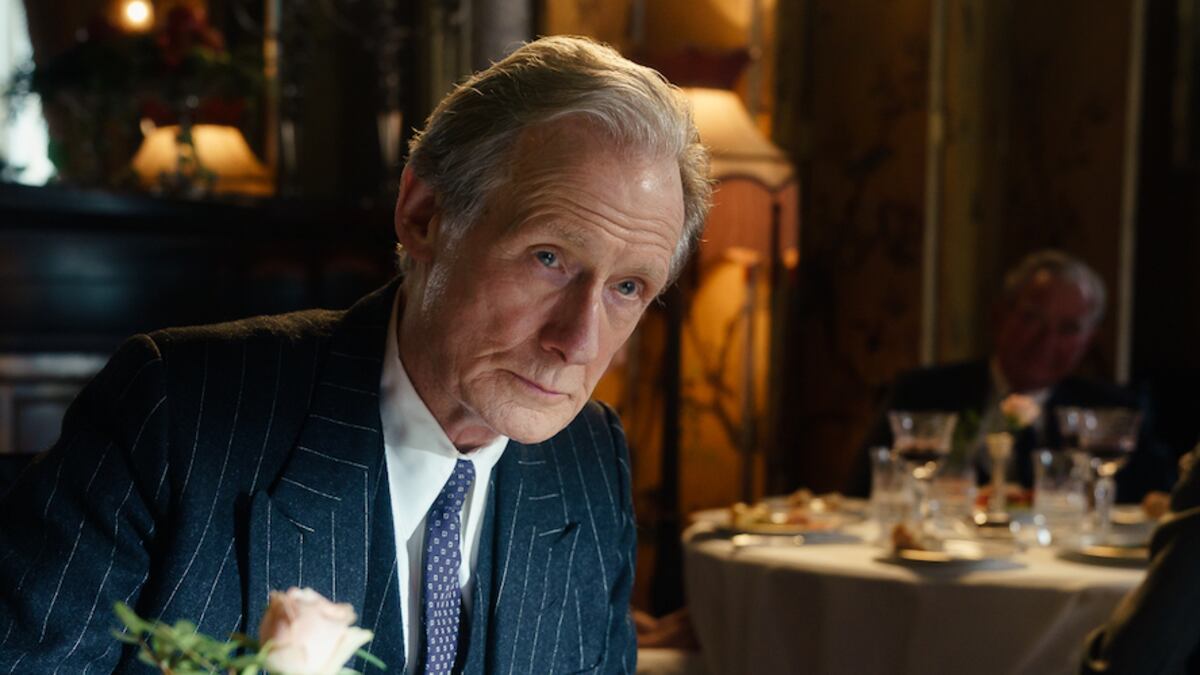LIVING
*** From Star Wars to The Magnificent Seven, Hollywood borrowing from Akira Kurosawa is a foundational practice. Thus, director Oliver Hermanus, acclaimed writer Kazuo Ishiguro, and actor Billy Nighy are late to the party in remaking Ikiru. But as that 1952 classic teaches us, there’s still time. Mr. Williams (Nighy) is a public works official in ‘50s London who receives a terminal cancer diagnosis and must learn to “live a little” in his final months. As a showcase for Nighy, the film is all a veteran character actor could wish for. He plays Williams as hushed and upstanding, with sadness carved into his frown lines decades ago, but the Love Actually standout beautifully sheds Williams’ middle-class English manners just in time to connect with co-workers and strangers (played by Aimee Lou Wood and Tom Burke). Still, taken as an adaptation of Ikiru, Living is a losing battle. Hermanus and Ishiguro replace the original’s voice-over with a forgettable young clerk (played by Alex Sharp) who serves as our guide to Williams’ redemption. That simplifies and shortens the film, but leaves the remains feeling overmanaged, even if the changes deepen our impression that Williams is holding the audience with him as he yearns for a deep breath and clear conscience. PG-13. CHANCE SOLEM-PFEIFER. Cascade City Center, Fox Tower, Movies on TV.
AFTER LOVE
*** Every now and again, we’re treated with a fresh story from a first-time filmmaker gifted with the perfect actor to tell it. After Love, the debut feature from Aleem Khan, stars Joanna Scanlan as a widow named Mary, who lives near the Dover cliffs and discovers that her recently deceased husband, Ahmed (Nasser Memarzia), had a secret family. After journeying 21 miles across the English Channel to see for herself, she’s mistaken for a housekeeper by Ahmed’s mistress (Nathalie Richard)—and quietly plays along while putting the pieces of her husband’s hidden life together. Rather than clean up the emotional mess left in the wake of loss, After Love seeks to redefine it. Khan’s subtle storytelling may not resonate with all viewers, but Scanlan, who earned a BAFTA for her mesmerizing performance (playing a character based on Khan’s mother) evokes authentic feelings through sparse dialogue that resonates beyond the credits, magnifying the impact of this uncompromised, beautifully human film. NR. RAY GILL JR. Fox Tower.
THE PALE BLUE EYE
** There are plenty of reasons to anticipate Scott Cooper movies; the director specializes in adult dramas with striking period-piece visuals and committed performances. But with a fatally flawed script, The Pale Blue Eye is no different than Cooper misfires like Antlers, Hostiles and Black Mass. Based on Louis Bayard’s work of historical fiction, the new film ushers detective Augustus Landor (Christian Bale) into an uneasy partnership with a young Edgar Allan Poe (Harry Melling) after a cadet turns up with his heart cut out at West Point in 1830. These investigators are no Holmes-Watson odd couple; they’re so mismatched they seem plucked from different subgenres, as if Poirot and Serpico collaborated on a case involving both intimate trauma and occult hooey. Melling (whose post-Dudley Dursley gauntness is at an all-time high) attempts an elevated, pained literary schtick as Poe, while Bale is expertly gruff (his weariness recalls Richard Burton in his later years). Their performances aren’t the problem—the grim, dragging detective narrative simply doesn’t gel with the in-story homage to the author who helped invent the form. Given the story’s flat complications, it’s frustrating how magnificent the movie appears when Bale is silhouetted in his top hat amid the Hudson Valley fog. Ultimately, Scott Cooper retains his title: master of “good on paper.” R. CHANCE SOLEM-PFEIFER. Netflix.
PLANE
* Plane, yes. Mmm-hmm. Ever since the project began rolling down the production runway, members of the critical community held a certain morbid curiosity about the sheer chutzpah teased by attaching such a moniker to the sort of boilerplate Gerard Butler vehicle (grizzled pilot must trust gentle-eyed felon’s foreigner-slaughtering skills to save passengers, souls) ordinarily loath to attract undue attention. Was this a working title left unchanged until too late? Was it meta-commentary upon the self-parodic snakes strangling tensions over post-Airplane! cinematic skies? A primitivist flex of irreducible stolidity? A nod to where the astral subsumes the material? Or, perhaps, did the screenwriter’s triangular-jet-crudely-scrawled-across-homeroom-desk imagery not fit up on theater marquees? Considering the keening artlessness with which Plane was conceived, delivered and sold, there’s been an odd streak of defensiveness from reviewers praising the rare 21st century popcorn flick to stay within its lanes, white knuckles unmoving as the speedometer melts away. Admittedly, director Jean-François Richet (Inner City, The Emperor of Paris) knows his way around a firefight, and Plane wrings more tension out of its fated first-reel crash than airborne thrillers with 10 times the budget. Still, don’t confuse a brisk pace and a streamlined narrative with a lifelong hack’s eagerness to attain cruising altitude. A lack of pretension shouldn’t excuse the utter absence of creative ambition. R. JAY HORTON. Cedar Hills, City Center, Clackamas, Eastport Plaza, Evergreen Parkway, Lloyd Center, Oak Grove, Pioneer Place, Progress Ridge, Studio One, Tigard, Vancouver Plaza.

